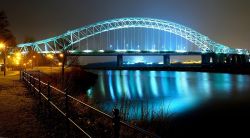Runcorn is an industrial town and cargo port in the Borough of Halton in Cheshire, England. Its population in 2011 was 61,789. The town is in the southeast of the Liverpool City Region, with Liverpool 11 miles (18 km) to the northwest across the River Mersey. Runcorn is on the southern bank of the River Mersey, where the estuary narrows to form the Runcorn Gap.
Runcorn was founded by Ethelfleda in 915 AD as a fortification to guard against Viking invasion at a narrowing of the River Mersey. Under Norman rule, Runcorn fell under the Barony of Halton and an Augustinian abbey was established here in 1115. It remained a small, isolated settlement until the Industrial Revolution when the extension of the Bridgewater Canal to Runcorn in 1776 established it as a port which would link Liverpool with inland Manchester and Staffordshire. The docks enabled the growth of industry, initially shipwrights and sandstone quarries. In the late 18th and early 19th centuries, it was a spa and health resort but this ended with the growth of polluting industries, especially soap and chemical works. In 1964, Runcorn was designated a new town and expanded eastward, swallowing neighbouring settlements and more than doubling its population.
Three bridges span the River Mersey and the Manchester Ship Canal at Runcorn: the Silver Jubilee Bridge, Mersey Gateway, and Runcorn Railway Bridge. Its location between Liverpool and Manchester and its links to the rail, motorway and canal networks have made it a centre for manufacturing, logistics, and wholesale and retail. The town's motto is Navem Mercibus Implere (Latin for "fill the ship with goods"), a classical quotation from Juvenal.
